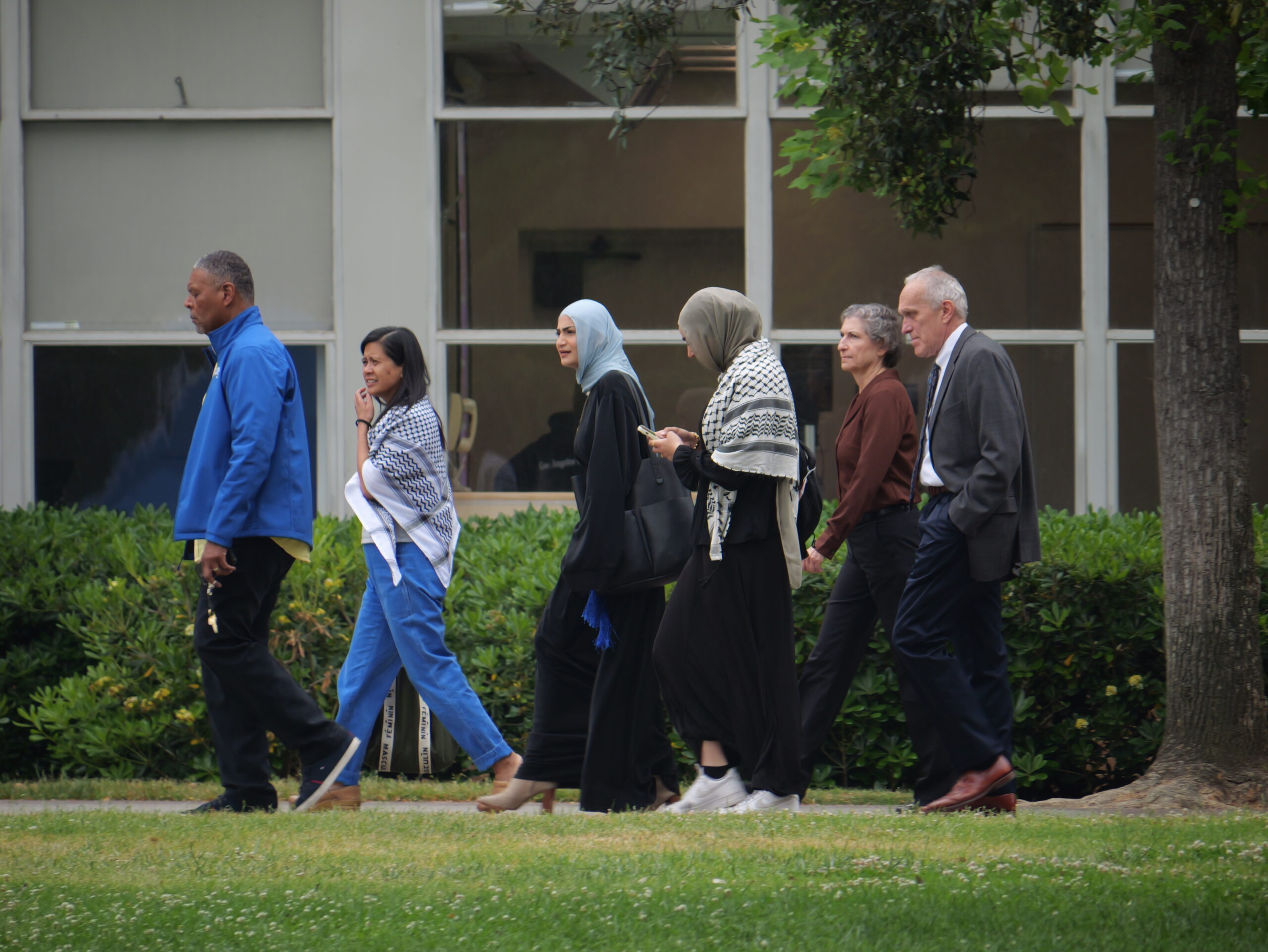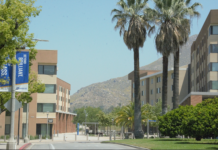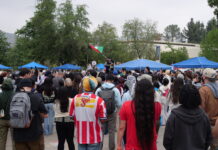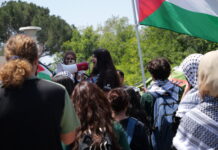
PC: Mamata Elangovan / The Highlander
After five days of camping out at the University of California, Riverside (UCR) Bell Tower, members of the Students for Justice in Palestine (SJP) encampment reached an agreement with administration addressing their demands and ending the encampment. In an exclusive interview with The Highlander, SJP President Hibah Nassar and Lead Negotiator Samia Alkam went into detail about what each point on the agreement entailed in regards to the original goals of the encampment.
Leaders of this protest came to an agreement with UCR officials on Friday, May 3, 2024 at approximately 12 a.m to end the encampment in return for certain concessions from the administration. This agreement was released to the campus community later that day at 11:35 a.m. For more information regarding the efforts leading up to the deal, check out “Seven months of advocacy,” by Mata Elangovan.
Negotiating this agreement were Lead Negotiator Samia Alkam and Students for Justice in Palestine (SJP) President Hibah Nassar. These UCR students signed this agreement alongside Chancellor Kim A. Wilcox, Vice Chancellor of Student Affairs (VCSA) Brian Haynes, Provost & Executive Vice Chancellor Elizabeth Watkins and Christine Victorino, School of Education Professor of Practice and faculty advisor for the protest.
Around 1 a.m. on May 3, 2024, following the finalization of the agreement, SJP announced on their Instagram that there would be a “Huge Announcement” regarding the negotiation efforts with administration. In anticipation of the announcement at the encampment, the crowd of protesters and members of the student body engaged in chants regarding Palestinian liberation, such as “From the sea to the river, Palestine will live forever,” and “Wilcox, Wilcox you can’t hide, we charge you with genocide.” Negotiators Nassar and Alkam alongside Chancellor Wilcox, VCSA Haynes and Provost Watkins addressed the crowd at 11:30 a.m. Following the announcement of the agreement, protesters began chanting slogans such as, “Wilcox, Wilcox on our side, we are anti-genocide,” and “I believe that we will win, I belive that we will win!”
Members of the encampment had demanded that UCR “withdraw from Israel’s apartheid Regime;” SJP had four original demands of the administration, all of which can be found on the SJP instagram. These demands were as follows:
UCR must “Disclose” all UCR investments to the campus community, providing “full transparency and student control of [UCRs] investment and funding;”
“Divest … funds from companies and institutions complicit in the israeli occupation, apartheid and genocide of the Palestinian people.”
“End the Silence” of UCR administration concerning lost Palestinian lives and “their complicity with the ongoing genocide in Gaza and the 76-year-long occupation of Palestine.” SJP also demanded that UCR “commit to the protection of Palestinian, Arab, Muslim and allied students of conscience who are facing unprecedented backlash, and call for an immediate ceasefire in Gaza.”
Finally, members of the encampment called for UCR to “sever ties and academic collaborations with Israeli Universities” as part of the Academic Boycott + Withdrawal demand. Specifically citing the “Education Abroad University of Haifa Israel Program” and the “School of Business Israel Residency Program,” demanding that UCR “completely divest [UCR student] tuition dollars from — and cut all institutional ties to — the zionist entity.”
Following the announcement of this agreement to the campus community, SJP released a separate Instagram post detailing that the “UCR encampment has officially had demands met by administration.” In this post, UCR SJP declared “we are proud to be the first campus in the University of California (UC) [system] to peacefully end our encampment, without any violence, arrests, or dismissals and meet the demands of students.” Although this resolution has resulted in the end of the encampment, according to SJP President Nassar, “this is not the end of holding our University [accountable] for any and all complacency in genocide. We will continue to hold the administration accountable for its actions, and we will continue to ensure that our demands are met.”
The five terms of the resolution and Lead Negotiator Alkam’s explanations are as follows:
“All currently public information on UC’s investments will be posted to the UCR campus website. It will continue to be updated as the UC releases more information. The goal is to get full disclosure of the list of companies in the portfolio and the size of the investments.”
The first demand met by the university was disclosure; this is meant to provide a degree of transparency between the students and the administration as to where university funds are being distributed. According to Lead Negotiator Alkam, all currently public information regarding UC investments will be compiled in a singular space online so that this information is more accessible and discernible to the average student. Alkam elaborated that the website will be updated as the UC Office of the President “provid[es] us [with] more information, specifically on the investments of our endowment.” She continued, explaining that “the goal is to get full disclosure of the list of companies in the [UC investment] portfolio and the size of the investments.”
However, Alkam acknowledged that without information from the UC Office of the President, who is responsible for managing the roughly $300 million UCR investment endowment, divestment through UCR was not possible. SJP’s goal here, according to Alkam, is to get a “material” win regarding their demands and organizers saw this attempt at transparency as a step in the right direction towards achieving divestment.
“The UCR Administration agrees to form a task force that includes students appointed by ASUCR’s Diversity Council and faculty appointed by the Academic Senate to explore the removal of UCR’s endowment from the management of the UC Investments Office, and the investment of said endowment in a manner that will be financially and ethically sound for the university with consideration to the companies involved in arms manufacturing and delivery. The goal of this task force is to produce a report to present to the UCR Foundation Board of Trustees by the end of Winter Quarter 2025. The task force will be formed by the end of the Spring 2024 quarter.”
Alkam highlighted that this point is the one most clearly associated with divestment goals. UCR administration agreed to the creation of a task force that includes students appointed by the Associated Students of UCR (ASUCR) Diversity Council and faculty appointed by the UCR Academic Senate “to explore the removal of UCR’s endowment from the management of the UC Investment Office.” This task force will have the responsibility of ensuring that the investments will be both “financially and ethically sound for the University,” not only “consider[ing] return on investment” but also ensuring things are ethically sound, “with specific regard to weapons manufacturing.”
This task force is projected to begin convening at the end of Spring 2024 until the end of Winter 2025 and give recommendations regarding removing the endowment from the UC Office of the President and finding an investment office that has no ties with companies who are associated with Israel and weapons manufacturing.
“Commitment to bimonthly meetings with the Associate Vice Chancellor (AVC) of Auxiliary Services and an ongoing review of Sabra Hummus consistent with existing product review processes until we can find a resolution.”
SJP has been working on the removal of Sabra Hummus from UCR’s campus for multiple years due to the open support of Israel exhibited by Sabra’s parent companies, PepsiCo and the Strauss Group. Alkam explained that SJP had success regarding this endeavor back in 2017 though the passage of a resolution in ASUCR, however, campus administration refused to take the product off shelves.
With this new agreement, SJP will hold bi-monthly meetings with the AVC of Auxiliary Services, and Sabra Hummus’ status as a product sold at UCR will be evaluated “in accordance with campus policies … allowing for a more permanent solution that cannot be reversed due to outrage,” stated Alkam. Currently, in comparison to the other two hummus brands sold by the university, Sabra brings in the most revenue, but SJP hopes that through organized boycotts of the product, these sale numbers will decline, causing it to be within the universities best financial interests to remove Sabra products from UCR campus.
“The School of Business has discontinued Global Programs in Oxford, USA, Cuba, Vietnam, Brazil, China, Egypt, Jordan, and Israel.”
Characterizing this as a “huge win,” Alkam explained that Professor Sean Jasso’s ‘Egypt, Jordan and Israel’ study abroad program through the UCR School of Business is prohibited conduct under the UC anti-discrimination policy; this policy prohibits discrimination based on “actual or perceived shared ancestry or ethnic characteristics” as well as “citizenship or residency in a country with a dominant religion or distinct religious identity.” Since Palestinian students are excluded from participating in this program because of Israeli laws restricting the movement of Palestinian citizens in and out of Israel, “it is not appropriate for this program to exist on [UCR] campus,” explained Alkam.
Global Programs were operated exclusively through the School of Business and therefore did not need to go through the same approval process as UCR Office of Study Abroad Programs. As a result, the entirety of Professor Sean Jasso’s Global Programs was disbanded and the only way for students to participate in study abroad programs now is through the UCR Office of Study Abroad.
“UCR will modify its approval process for all study abroad programs to ensure compliance with UC’s Anti-Discriminatory Policies.”
Effective immediately, all study abroad programs violating the UC anti-discrimination policy were disbanded, meaning that, although Israel study abroad programs are still offered through the UC system, UCR students cannot participate in any study abroad programs in Israel. As of Friday, May 3, 2024, UCR students no longer have access to any Israeli study abroad programs through global programs or the UCR Office of Study Abroad.








